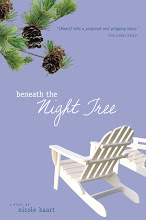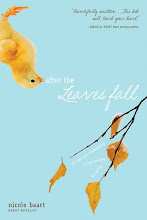It’s Sunday afternoon and, as usual, something Aaron preached about this morning is rattling around in my mind. (You must get so sick of my quasi-theological ramblings… Sorry. But am I sorry enough to stop…? Umm, no.)
Since today is the first Sunday of Advent, the sermon centered around the theme of hope. Usually Aaron likes to preach exegetically rather than thematically, but for the sake of the traditional advent calendar, he was willing to abandon his typical, single-text sermon structure and play a little “Old McDonald Had a Sermon” (with a text-text here and a text-text there, here a text, there a text, everywhere a text, text). He-he-he! Anyway, I’m glad that he did. I got a lot out of his Bible-flipping.
In a nutshell (though much more eloquently than my attempt at summation), Aaron asserted that hope is a process. It is something that exists both NOW and NOT YET. Our hope is secure (the life and death of Jesus Christ), but it is also waiting completion (His second coming). And in this tension of waiting and hoping, of losing the battle but winning the war, we must exist in the balance between knowing our salvation is secure and enduring the suffering that this world has to offer.
This is one of the glorious paradoxes of God that continually confounds spiritual skeptics: “How can there be a God when there is so much suffering in the world?” I can’t help but wonder, “How can there NOT be a God when there is so much suffering in the world?” The suffering isn’t the point, the enduring hope for renewal is. We all know, we all know, that this is not the way things are supposed to be. Nothing is quite right. Even the good stuff--the fantastic relationships, the gorgeous vistas, the moments of clarity--are a dim reflection of what we all know in our hearts they should be. We long for something more. And we can’t help it: we have eternity set in our hearts. So we hope.
What a difficult thing to believe at the edge of our postmodern age. If nothing is universal, if we must lack the optimism for a truth that will finally explain everything for everybody, how can we offer insight into a persevering hope? A hope that will transcend all the sorrow and darkness and disbelief? A hope that can cover us all?
I think we have to abandon the notion that hope is something we can package up and offer as a universal gift, one size fits all. Hope that promises measurable results feels cheap at best. But if we can grasp the concept that we are the people of the second advent, that in the character of our perseverance through the suffering we have endured we will exhibit a glorious, eternal hope, I think we will become a light that shines in the darkness. We are the personification of advent. We are the hands and feet of Christ to this age. We are the hope He has to offer His beloved world.
Wow. What an amazing challenge to Christians. And what a challenge to those of us who consider ourselves artists. Our lives, our words, our paintings, our everything has the potential to offer hope. We get to be a mirrored reflection of the glorious hope that is fulfilled in Christ. What an opportunity. And what a responsibility.
I think the reason why all of this weighed so heavy on me today is because I just finished The Inheritance of Loss by Kiran Desai. (Yes, I’ve been reading it forever and a day.) Anyway, I’ve been trying to put my finger on why my initial love of the book turned to a growing dissatisfaction that finally blossomed into a full-fledged dislike of such a critically acclaimed work. Kiran writes beautifully. Her prose is stunning. And her story is gripping. But it’s so hopeless. Utterly and completely hopeless. Yuck. It was ultimately so heavy and so sad that I had to convince myself to keep reading it. I just knew it would end in tragedy. Thankfully, Kiran was kind enough to offer one itsy-bitsy, teeny-weeny (albeit shallow and unsatisfying) hope in the final page of the book. But it wasn’t enough for me.
Don’t get me wrong, I’m all about examining the depth and breadth of suffering. I think that in many ways coming face to face with our need is a healing and even affirming experience. I believe it can deepen our love and appreciation for the God who saves us. But without the promise, without hope, what does that sort of reflection have to offer us? Absolutely nothing.
I desire for my writing to be hope-filled. I want it to be an impetus that drives people to continue to look forward, to look for God in the midst of it all. I ache for people to be able to find meaning and hope woven into the fabric of their own broken lives. I know that I have (that my writing has) a long way to go, but I am holding this objective in front of me. I am (we are) the personification of hope. May I (we) be worthy of the call.
Sunday, December 2, 2007
Subscribe to:
Post Comments (Atom)










It is true. If I have no hope, I am nothing, and all is for naught. I'm thankful for the hope of the final victory!
ReplyDelete